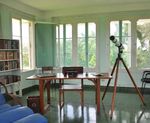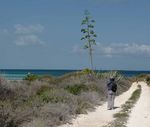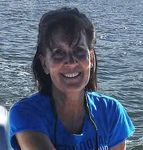Cuba Mound house MuseuM expedition April 30 - May 8, 2020
←
→
Page content transcription
If your browser does not render page correctly, please read the page content below
Cuba
Trinidad
Cuba
Mound house museum expedition
April 30 – May 8, 2020
Over the course of centuries, Cuba has meet your leader
been shaped by interactions between Your tour leader, Penny Jarrett, has over 25
geography and culture, resulting in a blend years of experience in environmental education,
of indigenous, European, and African wildlife conservation, field work, archaeology,
and leading group tours. Penny has traveled
influences. This program examines different extensively and more specifically to Belize and
aspects of the country’s cultural and natural Guatemala multiple times to assist with manatee
heritage, from pre-Columbian communities, research, provide education programs in local
villages, help with medical missions, study
to the 19th century sugar trade and its Belizean wildlife and explore Mayan sites. Working for the Cincinnati Zoo
lasting impact, to more recent history, like the & Botanical Garden, her interest in primates took her to the Republic of
1959 Revolution. Get to know the Cuban Congo to conduct research on the western lowland gorilla, forest elephant,
and other wildlife. She has worked for the Florida Fish & Wildlife
people and their stories as you meet with Conservation Commission to monitor nesting shorebirds and has been an
artists, converse with taxi drivers in their avid birder for many years. Penny is currently the Education Coordinator
classic American cars, and visit museums at the Mound House, a museum that is located atop a 2,000-year-old
Calusa Indian archaeological site in Fort Myers Beach, Florida, which
and historical sites. Plus, look for native and
provides hands-on learning experiences about Florida’s human history,
endemic wildlife in Zapata National Park. wildlife, and natural environment.
holbrook.travel/moundhouse-cu20Program Highlights by splendid villas. Next, explore Old Havana on foot.
During the walk, visit four of Havana’s historical
• Stroll the cobblestone streets of Old plazas: Plaza de la Catedral, Plaza de Armas, Plaza
Havana, Trinidad, and Cienfuegos for a look de San Francisco, and Plaza Vieja. After lunch at
at the country’s colonial architecture. a restaurant in Plaza Vieja, visit the Archeological
• Learn about indigenous cultures like the Museum of the City Historian. The museum is
Siboney and Arawak and see collections of housed in a historic building with murals dating
their utensils, tools, and pottery. back to the 17th century and contains exhibitions of
pre-Columbian art, vessels, textiles, and household
• Contemplate the legacy of Cuba’s sugar objects from the 16th to 19th centuries. Overnight at
trade at a former plantation. Hotel Nacional. (BLD)
• Witness the nightly cannon firing ceremony
at La Cabaña fort.
• Visit Ernest Hemingway’s former home,
where he wrote classics like “For Whom the
Bell Tolls” and “The Old Man and the Sea.”
Itinerary
BLD = Breakfast, Lunch, Dinner
Classic car by Michelle Korczynski
April 30 - Havana
Upon arrival at the José Martí International Airport May 2 - Havana
in Havana, transfer to Hotel Nacional. After This morning, visit the Montane Museum at the
checking in, visit the nearby Callejón de Hamel University of Havana. The museum is devoted to
to experience Afro-Cuban music, dance, and art. Cuban archaeology, with collections that include
Colorful murals adorn the walls of this narrow utensils, tools, and pottery. Its exhibits focus on
alleyway in the Centro Habana neighborhood, the culture of the indigenous communities that
and the sounds of drums and rumba fill the air. inhabited pre-Hispanic Cuba, particularly the
While here, learn about the history and culture of Siboney and Arawak cultures. Next, visit Ernest
Afro-Cuban society. In the evening, enjoy a group Hemingway’s former home, Finca La Vigía, in the
welcome dinner and orientation at Café Laurent. modest town of San Francisco de Paula. The home
(Check-in at the hotel begins at 4 pm). Overnight at was purchased by Hemingway in 1940, and it is here
Hotel Nacional. (D) that he wrote two of his most celebrated novels, “For
Whom the Bell Tolls” and “The Old Man and the
May 1 - Havana Sea.” After lunch, visit Morro Castle and Fortaleza
Start today with a tour of Havana by classic de San Carlos de la Cabaña. Both forts were built to
convertible car. The city is a living time capsule, protect Havana from pirates. Morro Castle features
from its Spanish colonial history to the enduring a lighthouse and was built between 1589 and 1630.
legacy of the Revolution, characterized by 1950s After the city was taken over by the British in 1762,
American cars and colonial architecture. Havana it was returned to Spain the following year, at which
can be divided into four main areas: the old quarter, point King Carlos III ordered the construction of La
which was declared a UNESCO World Heritage Site Cabaña to ensure they would not be attacked again.
in 1982 and, as the name suggests, is the historical About 4,000 men, including Mexican and Indian
heart of the city; central Havana, containing the prisoners from the Yucatán Peninsula, worked on the
famous Paseo del Prado, Capitol building, and many project. Today, the historical complex features several
outstanding museums; Vedado, the modern political museums, and each night at 9 pm there is a cannon
and cultural center that includes Revolution Square; firing ceremony at La Cabaña. After enjoying dinner
and Miramar, Havana’s most elegant quarter, whose in the area, return to La Cabaña to see the cannon
main, tree-lined avenue, Quinta Avenida, is flanked ceremony. Overnight at Hotel Nacional. (BLD)May 3 - Trinidad for centuries. The unique culture in Cienfuegos is
Depart Havana early this morning and head south attributed to its history as a French enclave. City
to the picturesque city of Trinidad (about a four- highlights include an architecturally noteworthy
hour drive). Upon arrival, have lunch and visit the group of buildings that were declared a UNESCO
Guamuhaya Archaeology Museum for an overview World Heritage Site in 2005. After lunch, continue
of life in Cuba from pre-Columbian times until the on to Hotel Playa Larga on the Zapata Peninsula
conquest. Exhibits include objects that belonged (another 1.5 hours). Overnight at Hotel Playa Larga.
to indigenous peoples who lived in the region (BLD)
during pre-Columbian times. Items are displayed
in chronological order spread through eight rooms. May 6 - Zapata
Overnight at Hotel La Popa. (BLD) Early this morning, go birding at Salinas. The Zapata
Peninsula is home to the largest wetlands in the
May 4 - Trinidad Caribbean. Seventy percent of the area is a Biosphere
Start today with a walking tour of the historical Reserve and Cuba’s largest national park. This area
center of Trinidad. Trinidad was established as is frequented by many species of waterbirds that live
Cuba’s third Spanish settlement in 1514 by Diego in mangrove swamps, coastal lagoons, and woods.
Velázquez, the island’s first governor. As you walk Over 165 native and migratory birds are found
along the cobblestone streets of this UNESCO here, as well as mammals, reptiles, amphibians, fish,
World Heritage Site—Cuba’s best-preserved colonial and invertebrates. Expect to see flamingos, Roseate
town—you will see colorful houses from a bygone Spoonbill, Glossy and White Ibis, herons, pelicans,
era, which remain well-preserved to this day. You Snail Kite, Peregrine Falcon, Cuban Black Hawk,
will also have the opportunity to interact with Belted Kingfisher, and others. Have lunch at Caleta
local artists, who are known in particular for their Buena, a beautiful inlet in the heart of the bay.
work in embroidery and textiles. Visit the Plaza This afternoon, go snorkeling to explore the marine
Mayor, which is surrounded by buildings from the biodiversity of the area. The sheltered coastline of the
18th and 19th centuries, when sugar from nearby bay is fringed by coral reef about 110 yards from the
plantations brought riches to the area. As in other shore. Overnight at Hotel Playa Larga. (BLD)
parts of the Americas, Spanish plantation owners
derived their wealth from the labor of enslaved May 7 - Havana
people who worked the fields—first from indigenous Early this morning, take an optional bird walk,
communities, and later, men and women brought followed by some time to explore the area. After
as slaves from Africa. This afternoon, head just lunch, return to Havana. This evening, enjoy a
outside the city to the Valle de los Ingenios (Valley farewell dinner. Overnight at Hotel San Felipe. (BLD)
of the Sugar Mills) to learn more. The three valleys May 8 - depart
here were the center for sugar production; at the Transfer to the airport for your flight home. (B)
peak of production, more than 50 sugar mills were
in operation, making Cuba the biggest producer of
sugar from the late 18th century to the late 19th
century. When slavery was abolished in 1886,
sugar production declined and most of the mills
turned to ruins. While here, visit the Manaca Iznaga
plantation, where the owner’s house, a tower, and
slave quarters still stand. Overnight at Hotel La Popa.
(BLD)
May 5 - Zapata
After breakfast, depart Trinidad and head west,
stopping in Cienfuegos (about a 1.5-hour drive) for
a walking tour and lunch. Cienfuegos is a charming
waterfront city situated on the bay of the same name.
Its scenic nautical setting has earned it the title, “the
Pearl of the South,” a description that has endured Zapata Peninsula by Debbie Jordanland Program pricing
$3,130 (based on a minimum of 8 participants)
Cost includes accommodations, meals as indicated,
entrance fees and activities, Cuban visa, private vehicle
transportation, full-time guide for the duration of the
program, donation to Mound House Museum, bottled
water on the bus, and carbon offset.
Cost does not include international airfare, gratuities,
alcoholic beverages, or items of a personal nature.
Estimated airfare
Havana’s Capitol building by Andrea Holbrook $375
Pricing based on round-trip flight from Miami on
American Airlines. Does not include baggage fees.
travel Protection
Holbrook Travel purchases Travel Protection on behalf
of all participants. These plans help provide coverage
once the trip has departed and offer benefits for Baggage/
Personal Effects, Accident & Sickness Medical Expenses,
Emergency Evacuation and more. Refer to the Plan
Document for more details.
Optional additional coverage is available in the form of
the Group Deluxe Plan, which offers benefits for Trip
Cancellation/Interruption, in addition to many other
Finca Vigía by Michelle Korczynski insurance benefits and non-insurance assistance services. If
interested in this optional plan, we can provide you with
rates and plan details.
The fine print
Price is based on double occupancy; for a single room
throughout the trip, add $440 per person. A $200 per person
deposit and enrollment form are required to secure your space
on the trip. This deposit is refundable excluding a $100
cancellation fee until March 11, 2020, at which time final
non-refundable payments are due.
This program includes optional carbon
offsetting with ClimateSafe. Learn more at
Cienfuegos architecture by Miguel Discart holbrooktravel.com/climatesafe
For more information or to enroll
Contact Penny Jarrett at penny@fmbgov.com or visit holbrook.travel/moundhouse-cu20You can also read
























































